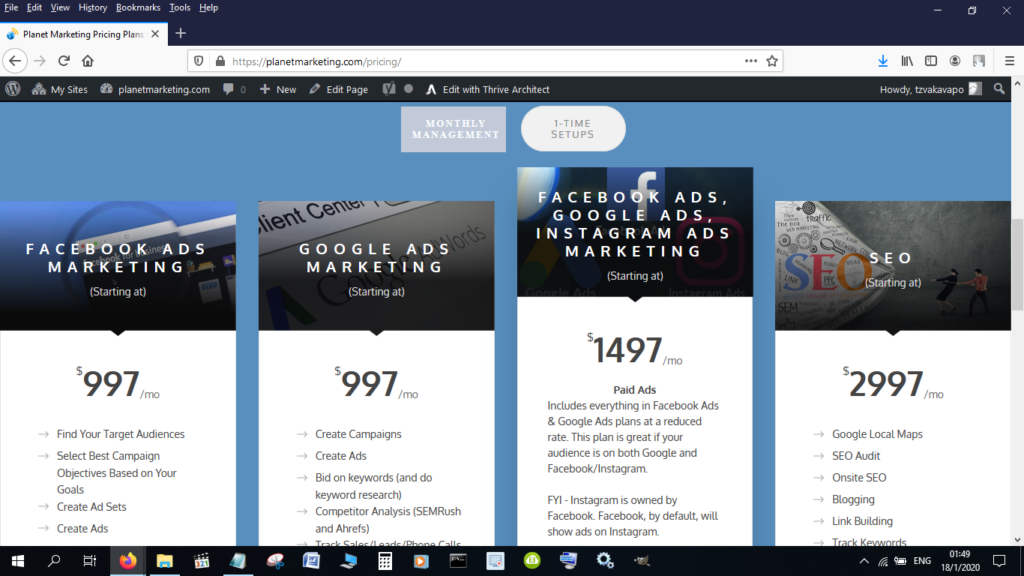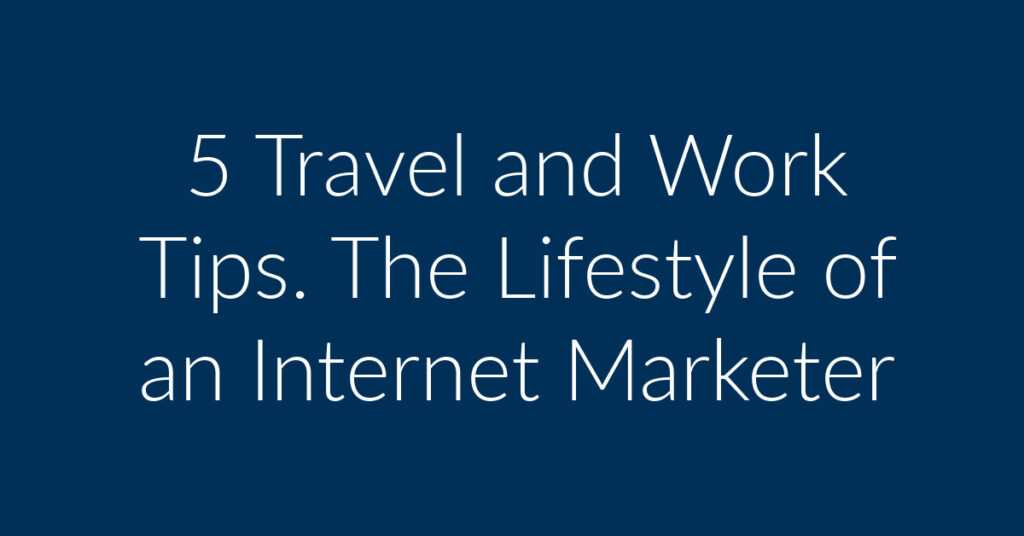Ask any Internet entrepreneur today, and you will be told that the best way of making money online is through affiliate marketing. But what is affiliate marketing and how does it work? If you have been asking yourself these questions, then you have come to the right place. My name is Francisco and today I am going to give you the lowdown on affiliate marketing. I know, a lot has already been said on the subject. However, this article is unique. I run an affiliate marketing program for my own company, Planet Marketing, which specializes in digital marketing products such as Facebook Marketing, Google Ads and Remarketing. Not only do I have an affiliate marketing program, but I am also an affiliate for other companies whose products I sell. So, you can be rest assured that I know what I am talking about here! In this article, I am going to:
- Define Affiliate Marketing
- Show you how Affiliate Marketing works from an affiliate’s point of view
- Explain how affiliates get paid
- Show you how Affiliate Marketing works from a business/vendor’s point of view
- Explain why all businesses should have affiliate marketing programs
What is Affiliate Marketing?
Affiliate marketing can be defined as a system under which a brand or vendor engages the services of individuals and companies; also referred to as affiliates, partners or publishers, to promote and sell the brand’s products and/or services. The strength of affiliate marketing lies in numbers. The more people sign up, the more both the brand and the affiliate are going to be able to earn.
In other words, it’s all about creating networks whose goal is to generate income. Whether you are a vendor or an affiliate, the primary purpose, when it comes to affiliate marketing, is to earn a living. Affiliates can be thought of as the modern version of the salespeople of yesteryear, who used to lug around suitcases filled with samples of various products. Today, they sit behind their computers, from where they sell products and services for brands around the globe.

Let me use the example of my own company, Planet Marketing, to illustrate the above definition of affiliate marketing. As already mentioned, my company specializes in various digital marketing products. A while back, I launched an affiliate marketing program under which people across the globe can sign up. Once they have signed up, they get an affiliate link. They then promote any of my products.
Let’s assume here that an individual wishes to promote my Facebook Ads Marketing Course. They reach out to people using various tools at their disposal. This could be through social media, using content marketing or even via word-of-mouth. Once someone has signed up for my SEO Marketing Plan using that affiliate’s link, the affiliate earns some money. It’s a win win situation!
The two sides of Affiliate Marketing
Affiliate marketing has two sides. On one hand, there is the side of the affiliate. Then there is the side of the vendor. These players view affiliate marketing differently. Under affiliate marketing, the brand/vendor provides the products and services, while the affiliate provides the customers.
Part 1: How Affiliate Marketing Works: The Affiliate’s Side

Most people are attracted to affiliate marketing by the prospect of making big bucks! Do it right, and affiliate marketing can become a great source of passive income. And we are all looking for passive income right? We all want to relax on the beach somewhere while the money is rolling in! The following are examples of the kind of people who typically become affiliates:
- Bloggers
- Social media users
- Owners of personal websites
- Shopping sites
- News websites
- Loyalty websites
- Coupon sites
- Mobile apps
- Niche content sites
Bloggers
Let me use the example of bloggers to show you how affiliate marketing works from the point of view of the affiliate. This is something that I can safely do since I am a blogger myself, through this website. Those going into Digital Marketing for the first time will often hear that blogging is the in-thing. Each day, thousands of individuals across the globe are wooed by stories of the riches and fame that have fallen into the laps of people that started their own famous blogs or websites.
Let’s assume that this line, which is not entirely untrue, has been thrown your way and you are now hooked. You begin to imagine yourself making millions through blogging. The first thing that you are going to do is start your own website. Now, this is something that’s simple enough to do. If you are interested, you can check out my posts covering some of the best web hosting companies that can be found out there.
Website Monetization

Anyway, the moment your site gets up and running, you will begin to look at ways through which you can monetize your creation. Believe me, website monetization is a topic that’s enough to crack your head. I know! I have been there. Anyway, you will soon hear that one way of monetizing your blog is through affiliate marketing.
Affiliates sell other people’s products and services
This is a phase that I went through with my own website, https://planetmarketing.com. After creating the site, I decided to monetize it by becoming an affiliate and selling other people’s products and services. Now, what you sell is going to be entirely dependent on the content of your website or blog. If your focus is on web hosting, then you will want to sell web hosting packages. Here are some of the affiliate marketing products and services that I sell via Planet Marketing:
- Web hosting packages: I am an affiliate of such companies as Bluehost, Kinsta, DreamHost, HostGator, WP Engine and many more. Check out this page for some of the best web hosting deals for the year 2020. (Also note how I am always on the lookout for chances to market the companies for which I am an affiliate.)
- Rank tracking services: I sell for companies such as SEMrush, RankWatch and RankTrackr. Check out this page for reviews of some of the best SEO rank trackers that can be found out there.
- Online review management services: I am an affiliate of such companies as eKomi, Trustpilot and Shopper Approved. You can check out reviews of these companies on this page.
As you can see, there is no limit to the number of products and services that affiliates can sell on behalf of other people. In fact, you can market as many products and services as you wish on your blog or website. And you can create as many blogs as you wish. But, is affiliate marketing limited to bloggers? The answer is no!
How affiliate marketing works through blogging
But how exactly do you use blogging for affiliate marketing? Blogging is all about content creation and marketing. As an affiliate of various companies, what I do is write lots of content on these companies. These could be in the form of reviews, such as my Bluehost, and Kinsta reviews. Or I could look at individual products being sold by the companies for which I am an affiliate. An example of what I am talking about here is my how to get Store Ratings article. Store Ratings are a product sold by a number of companies for which I am a partner.
Include your link in the article
The trick here lies in making sure that people sign up using your link. It’s important, therefore, to include it in the content that you create. As an example, if I write a Shopper Approved review article, I make sure that my Shopper Approved affiliate link is prominently displayed so that people can click on it.
Create well written, relevant content that ranks
Using a blog or website to market affiliate products is mostly about Search Engine Optimization (SEO). What you want is to create content that ranks at or near the top on Google. Once you have done that, people will then be able to find and read your articles. You will then be able to convince them that such and such a product is good for them.
As an example, my article on how to get Store Ratings consistently ranks near the top for the relevant keyword. What this means is that I get a lot of clicks on a daily basis for this article. That, in turn, translates into a lot of potential for sales!
Using social media for affiliate marketing

I am going to use the example of social media to further show you how affiliate marketing works from the point of view of the affiliate. Let’s assume that you have signed up, like I did, with Shopper Approved, a company that handles online reviews for businesses. Once you have signed up, you will get an affiliate link. Wondering what an affiliate link looks like? Well, here is mine from Shopper Approved:
The moment you get your affiliate link, you can then use it to sell Shopper Approved’s services. One way of doing this would be to reach out to your friends and followers on social media. We all use Facebook, Twitter, Instagram and other platforms, right? Well, if you have thousands of followers on these platforms, you can reach out to them and try to convince them to sign up with Shopper Approved, or any other company, using your affiliate link. You can, as an example, post on your wall something like:
I use Shopper Approved for Product and Store Ratings! Sign up using my link to get a discount today!
Alternatively, if you know someone that you think is a good match for the products or services that you are selling, you can simply reach out to them directly via social media.
Selling Affiliate Products via Email

You can also use email to sell various products for brands for which you are an affiliate. The major advantage here, from an affiliate’s standpoint, is that there is a higher chance of getting people to sign up. That’s assuming that you are only going to be sending emails containing your links to people relevant to the products and services that you are selling. As an example, sending an email selling a SEMrush product to someone that you know does not have a website or blog would be entirely a waste of time. However, if you have friends and relatives that you know could use the product or service that you are selling, then it would be better to reach out to them using email than through any other channel.
Tracking affiliate sales
Most people who sign up for affiliate programs are worried about the issue of tracking sales. Let’s assume, as an example, that you have signed up to become a Kinsta affiliate. If you are using content marketing to reach out to people, how are you going to keep track of the sales that you make on behalf of Kinsta? Isn’t there room for brands to cheat affiliates out of their bonuses by under-reporting sales?
Well, in reality, this is something that could very well happen. The whole affiliate marketing nexus is built around trust. As an affiliate, you are going to have to trust that the company that you sign up for has robust tracking mechanisms and is not going to try and cheat you out of your earnings. There are, however, a number of tools that you can use to track your earnings:
- You can use your own affiliate dashboard to track sales. Most brands that offer affiliate programs will give you access to a dashboard where you can view your sales.
- You can use Google Analytics to get an idea of the number of clicks that you are getting on an affiliate link.
- Tracking clicks on your affiliate links can also be done using your WordPress dashboard.
Use Affiliate Marketing Networks to find relevant brands
How are you going to be able to find the companies for which you can become an affiliate? And isn’t the process of signing up for each of these companies rather cumbersome? Well, the good news is you have alternatives, as an affiliate, when it comes to signing up. You can, as an example, hit up individual companies that you are interested in and sign up for their affiliate programs. This is what I do.
Alternatively, you can sign up for any of the affiliate marketing programs that are out there. Of these, perhaps the best known is CJ Affiliate (formerly known as Commission Junction). CJ Affiliate serves as a platform where merchants (brands, companies) meet publishers (affiliates). Instead of going after individual companies, you can simply sign up with CJ Affiliate. As an example, most of the web hosting companies for which I am an affiliate can also be found on CJ Affiliate. Once you have signed up, you can then get links for the companies that you are interested in. If, as an example, you are interested in Bluehost, you will be able to get a Bluehost affiliate link via C.J. You can then use this link to promote Bluehost using whatever channel is convenient to you.
Affiliate Marketing Networks charge a commission
The major disadvantage of using an affiliate marketing network is that you get charged a commission upon making a sale. If, as an example, someone signs up for Bluehost using your link, C.J. will get a certain percentage of the amount you will get from Bluehost. This does not apply if you get your affiliate link directly from Bluehost!
How affiliate payments are made

How do affiliates get paid after making sales? There are two ways through which you can get paid after making an affiliate sale.
Once off payments
Affiliates can get paid a once off amount after making sales. This is the most popular model when it comes to affiliate sales. Let’s assume, as an example, that I have managed to convince someone to sign up with Bluehost. Web hosting companies will mostly pay you once off amounts that average around $100. So, you get about $100 for each sale that you make and afterwards, you get nothing.
Recurring payments
This model has been gaining in popularity over the past few years. Instead of getting a once off amount, the affiliate gets paid a recurring amount for as long as the signup remains active. As an example, if I manage to get someone to sign up with SE Ranking, I will be able to get a commission for as long as that person continues to renew their subscription. So, if the people that I get to sign up stay active for 10 or so years, I will still be receiving money from SEMrush for that long.
That, clearly, is an attractive proposition from the point of view of the affiliate. At Planet Marketing, I receive thousands of dollars on a monthly basis as recurring income from affiliate sales. Some of these sales were made 10 years ago! So, I am sure that, going forward, even if I stop doing what I am doing today, I will still be earning something from the sales that I have made so far. Now, that’s the definition of passive income!
Part 2: How affiliate marketing works: The merchant, brand/advertiser’s perspective
Now that we have looked at how affiliate marketing works from the point of view of the affiliate, it’s time to take a look at the merchant’s side. By merchant, we mean the company or brand that’s running the affiliate program. This is the entity whose products and services are being sold with the aid of many affiliates across the globe. I have already noted that I am both a merchant and an affiliate. Planet Marketing offers the following services:

These are the products that Planet Marketing affiliates can sign up to sell. Let’s assume that John who lives in Bangladesh comes across my site while looking for affiliate marketing opportunities. John is then free to sign up for my affiliate program. Afterwards, he will get a unique affiliate link. From there, it’s up to him to determine how he is going to sell any of the products that my company offers. I have already mentioned in part one of this article that you can reach out to people using email, social media or through content marketing. Whatever the marketing channel chosen, I only get to pay them after they have made a sale. However, outcomes for affiliates are not limited to making sales. They can be any of the following:
- Selling products and services
- Generating leads
- Simply getting people to sign up
Which industries offer affiliate marketing?
There is really no limit to the companies that can offer affiliate marketing. As long as you are in business, you can get people to do the selling of your products and services on your behalf. The following are a few of the sectors that typically employ affiliate marketing:
- Retail
- Finance
- Travel
- Gaming
- Digital Marketing
How businesses track sales by their affiliates
The one characteristic of affiliate marketing is that it’s a mutually beneficial relationship between the brand and the affiliate. The brand benefits through more sales, while the affiliate gets a monetary reward for their efforts. For many brands, affiliate marketing sales form the bulk of their revenue. Underpinning this relationship is the issue of tracking. I have already mentioned in the previous section that most affiliates worry about being able to keep track of the sales that they make for brands. I also noted that affiliates can use Google Analytics, among other tools, to get a good idea of the sales that they are making on behalf of merchants. But how do merchants keep track of affiliate sales? How do you know which of your affiliates has made which sales?
Cookies
Cookies are what make tracking of affiliate marketing sales possible. Merchants use them to keep track of their affiliate’s sales. In reality, this whole system may sound more complicated than it really is. Whatever the program that you, as a business, use to run your affiliate marketing program, you can rest assured knowing that proper tracking of sales will be provided. The metrics that are tracked include the following:
- Sales
- Orders
- Subscriptions
- Registrations
- Conversion Rates
- Customer Lifetime Value
Tips on managing your brand’s Affiliate Marketing program
Companies have three choices when it comes to the management of their affiliate marketing programs. Firstly, you can, as a brand, choose to manage your affiliate marketing program in-house. Alternatively, you can choose to use an affiliate marketing agency to manage your affiliate programs. You may also come across brands that use both systems.
Managing an affiliate marketing campaign in-house
This is what I have chosen to do for my own affiliate marketing program. This type of approach works great if you have a small number of partners. You may need to appoint an in-house affiliate manager to move things along.
Using an agency to manage your affiliate marketing program
This is the second option when it comes to the management of a brand’s affiliate marketing program. There are countless affiliate marketing agencies out there. This path is usually best for companies that are looking to really achieve growth.
The hybrid approach to affiliate management
Most of the web hosting companies that are out there use this approach to affiliate marketing. A good example is InterServer. This web hosting company has an affiliate marketing program running on CJ Affiliates. So, if an affiliate signs up for CJ Affiliates, they are able to get access to this program. InterServer, on the other hand, also runs its own affiliate marketing program in-house. This program is open to everyone who signs up for web hosting using InterServer.
So, when you sign up to create your website and have chosen InterServer as your host, you automatically get an affiliate link that you can use to market the company’s products to other people. You are rewarded for any sales. I have already mentioned that most web hosting companies will pay an average of $100 for an affiliate sale. That’s roughly what you will get from InterServer.
Should I start an affiliate marketing program for my business?
This is something that companies probably ask themselves on a daily basis. Is it worthwhile running an affiliate marketing program? The answer to that is a massive yes! The Internet is vast. Yet in this vastness, there lie both opportunities and perils. As a brand, you are probably not going to realize your full potential in terms of marketing on your own. It’s simply not possible. What you need to do is engage the services of other people around the world to act as ambassadors for your business. Once you have your program up and running, you can sit back and relax even as complete strangers market your stuff.
The great thing is that affiliate marketing is not limited by geography. As a brand, you can get people in various parts of the globe to market your brand on your behalf. You can get people in Zimbabwe, Bangladesh, the United States, Canada and all over the world to do affiliate marketing for you. The thing that makes affiliate marketing great is that you don’t actually pay unless an affiliate has made a sale. Once you have your program set up, you can sit back and relax while your team of affiliates is doing the hard work on your behalf.



